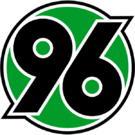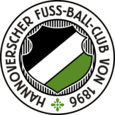Hannover 96
 |
|||
| Full name | Hannoverscher Sportverein von 1896 |
||
|---|---|---|---|
| Nickname(s) | Die Roten (The Reds) | ||
| Founded | 12 April 1896 | ||
| Ground | AWD-Arena (Capacity: 49,000) |
||
| President | Martin Kind | ||
| Manager | Mirko Slomka | ||
| League | Bundesliga | ||
| 2009–10 | Bundesliga, 15th | ||
|
|||
Hannoverscher Sportverein von 1896, commonly referred to as Hannover 96, Hannover or simply 96, is a German football club based in the city of Hanover, Lower Saxony.
Contents |
History
Foundation to WWII

Hannover 96 was founded on 12 April 1896 as Hannoverscher Fußball-Club 1896, upon the suggestion of Ferdinand-Wilhelm Fricke, founder of the Deutscher FV 1878 Hannover.[1] Their initial enthusiasm was for athletics and rugby; football did not become their primary interest until 1899. Most of the membership of Germania 1902 Hannover became part of 96 in 1902, while others of the club formed Hannoverscher Ballspielverein. In 1913, they merged with Ballverein 1898 Hannovera (formed in the 1905 merger of Fußballverein Hannovera 1898 Hannorver and Hannoverscher BV) to become Hannoverscher Sportverein 1896.
Hannoverscher FC's colours were black-white-green, but they played in blue, while BV played in red. The newly united team kept black-white-green as the club colours, but they chose to take to the field in red, giving the team the nickname Die Roten (en: The Reds). The team's third jersey is in the club's official colours.
The club made regular appearances in the national playoffs through the early 1900s, but were unable to progress past Eintracht Braunschweig, planting the seeds of a rivalry that has survived to this day. HSV continued to field strong sides and make national level appearances on into the 1920s.
Under the Third Reich German football was re-organized into sixteen top-flight leagues in 1933 and Hannover became part of the Gauliga Niedersachsen. They appeared in the country's final rounds in 1935 and sent representatives to the national side the next year. They won their first national championship in 1938 in what was one of the biggest upsets in German football history when they beat Schalke 04, the most dominant side in the country in the era. The two sides played to a 3:3 draw before Hannover prevailed 4:3 in a tension filled re-match. In 1942, the team moved to the newly formed Gauliga Braunschweig-Südhannover.
Post-War era
Like most other German organizations, the club was dissolved after World War II by occupying Allied authorities. A combined local side was assembled in August, 1945 and the next month a mixed group of players from Hannover 96 and Arminia Hannover played their first post-war match against a British military team. HSV was later formally re-established as Hannoverscher SV on 11 November 1945 before re-adopting its traditional name on 27 April 1946.
The club resumed league play in 1947 in the first division Oberliga Nord and was relegated, but quickly returned to the top-flight in 1949. Hannover 96's next appearance in a national final would not come until 1954 when they soundly defeated 1. FC Kaiserslautern 5:1. The beaten side included five of the same players who would go on later that year to win Germany's first World Cup in a surprise victory known as the Miracle of Bern.
In 1963, the Bundesliga, Germany's new professional football league, began play with sixteen of the nation's top teams. Hannover played in the Regionalliga Nord (II) that season, but earned promotion to the senior circuit in the following year. The club's advance to the Bundesliga in 1964 was well received as they set a league attendance record in their first year, averaging 46,000 spectators a game.
96 played at the upper level for a decade, until finally relegated to the 2nd Bundesliga Nord for the 1974–75 season. They bounced right back, but were again sent down, this time to spend seventeen of the next twenty years in the second tier.
Reunification to present
The club suffered from money problems in the late 70s and again in the early 90s. Then, in 1992, Hannover put together an impressive run that would lead them to the capture of their first DFB-Pokal and help to set their finances right. That run included victories over Bundesliga sides Borussia Dortmund, VfL Bochum, Karlsruher SC, Werder Bremen, and Borussia Mönchengladbach, as they became the first lower division side to win the competition. Hero for the cupwinners was goalkeeper Jörg Sievers who made two saves when the semi-final match went to penalties and then scored the winner in his own turn at the spot. In the cup final, he again made two saves when that match was also decided on penalties.
The team's low point came with demotion to Regionalliga Nord (III) for two years in 1996–98: the fact that the fall from the second league came during their anniversary year unfortunately made them a laughing stock among fans of rival teams for years to come. Hannover made a fresh start with a new team of hungry youngsters, many of whom went on to play for the national team (Gerald Asamoah, Sebastian Kehl, Fabian Ernst) or impress in the Bundesliga. 96 returned to tier II play in 1998, and to the Bundesliga in 2002 on the strength of a record setting 75 point season.
Since their promotion the club have consolidated in the top flight, achieving a string of mid-table finishes under the command of several managers. Current coach Dieter Hecking was brought in just weeks into the 2006–07 season after a disastrous start under Peter Neururer, in which the club lost the first 3 matches by a combined 11 goals. Season 2007–08 showed some early promise with impressive pre-season wins over Rangers and Real Madrid. However, they earned mixed results in their opening six Bundesliga matches. The team then put together a three match winning run, capped by a 2–0 win at champions VfB Stuttgart, to surge into the top six. Following the winter break Hannover slipped after putting forth some disappointing performances which they turned around to be defeated only 2 times in their last 11 matches of the season. This secured a points record of 49 for Die Roten in the Bundesliga thus ending them in 8th place.
The 2008–09 season started undesirably for 96 with losses. However it looked to have been rectified with a 5–1 thrashing of Borussia Mönchengladbach, a shock 1–0 win over Bayern Munich at home, which hadn't occurred for 20 years, and a thrilling 3–0 victory over Hamburg SV. Hannover settled in the lower mid table until the winter break. The second half of the season consisted of inconsistent results, relying almost entirely on home form to keep Hannover in the top league. 96 finally achieved an away win with a few games remaining which boosted them away from trouble and stabilized them which led to an 11th place finish. The season was one of inconsistent form and long injuries to key players.
The 2009–10 season was launched with new optimism with a new kit being released which included traditional away and alternative kits. Hannover also signed a new technical director in Jörg Schmadtke which brought a new perspective to the club. The new signings were Karim Haggui and Constant Djakpa from Bayer Leverkusen, Valdet Rama from FC Ingolstadt. The season started undesirably with a late 1–0 loss to Hertha BSC and a disappointing home draw to Mainz 05, after which coach Dieter Hecking resigned voluntarily. He was succeeded by former assistant Andreas Bergmann. As the season continued, once again Hannover had many key players injured including the majority of attacking players and key defenders, as well as the shocking and tragic death of German international goalkeeper Robert Enke. Andreas Bergmann was removed as coach and replaced by Mirko Slomka shortly after the winter break. Arouna Koné and Elson were signed to boost the squad
Recent seasons
| Year | Division | Position |
| 2000–01 | 2. Bundesliga (II) | 9th |
| 2001–02 | 2. Bundesliga | 1st (promoted) |
| 2002–03 | Bundesliga (I) | 11th |
| 2003–04 | Bundesliga | 14th |
| 2004–05 | Bundesliga | 10th |
| 2005–06 | Bundesliga | 12th |
| 2006–07 | Bundesliga | 11th |
| 2007–08 | Bundesliga | 8th |
| 2008–09 | Bundesliga | 11th |
| 2009-10 | Bundesliga | 15th |
Honours
German Cup play has long been dominated by first division teams: Hannover's 1992 German Cup win made them the only non-Bundesliga side to take that prize since the formation of the professional league in 1963.
- Südkreisliga champions: 1921
- Gauliga Niedersachsen champions: 1935, 1938
- Gauliga Niedersachsen-Süd champions: 1940, 1941
- Oberliga Nord champions: 1954
- 2.Bundesliga-Nord champions: 1975
- 2.Bundesliga champions: 1987, 2002
- Regionalliga Nord champions: 1997, 1998
- German champions: 1938, 1954
- German Cup winners: 1992
Reserve team
- German amateur champions: 1960, 1964, 1965
Youth
- German Under 17 championship runners-up: 1994, 1995
- Under 19 Bundesliga North/Northeast champions: 2004
Stadium
Hannover 96 plays in the AWD-Arena, built in 1954 as the "Niedersachsenstadion", which now has a capacity of 49,000 spectators. During the 2006 World Cup the stadium was the site of four first round matches and one Round of 16 match. The stadium had also served as a site for matches of the 1974 World Cup and the 1988 European Championships.
Club culture
Hannover's main rival is Eintracht Braunschweig while other less ancient rivalries include those with SV Werder Bremen and VfL Wolfsburg. Hannover fans have developed some recent ill feeling towards FC Energie Cottbus based on an incident in the 1997 Regionalliga (III) promotion round for the 2. Bundesliga. The floodlights at the Cottbus ground broke down during the game and many Hannover fans believed this was done deliberately and the effort to fix the lighting was half-hearted. Cottbus later won the rescheduled match 3–1 to advance.
Hamburger SV is seen as a friendly club whose supporters share the rivalry with SV Werder Bremen. Both clubs are often referred to as HSV. Hannover's supporters also have a good relationship with the fans from Odense Boldklub. Both clubs's fans have traveled to each others games to support one another. There is also a friendship with Arminia Bielefeld, a club playing in the 2. Bundesliga.
Players
For recent transfers, see List of German football transfers summer 2010 and List of German football transfers winter 2009–10.
Current squad
Note: Flags indicate national team as has been defined under FIFA eligibility rules. Players may hold more than one non-FIFA nationality.
|
|
Manager History
|
|
|
Hannover 96 Amateure (II)
Hannover fields a successful amateur side that has three German amateur championships to its credit (1960, 1964, 1965) as well as losing appearances in the 1966 and 1967 finals. The second team has also taken part in the German Cup tournament and currently plays in the Oberliga Nord (IV).
Honours
- Amateurliga Niedersachsen-West champions: 1960
- Amateurliga Niedersachsen-Ost champions: 1964
- Amateurliga Niedersachsen champions: 1965, 1966, 1967
- German Amateur champions: 1960, 1964, 1965
Hannover 96 II squad
As of 1 August 2009
Manager: ![]() Thomas Flath
Thomas Flath
Note: Flags indicate national team as has been defined under FIFA eligibility rules. Players may hold more than one non-FIFA nationality.
|
|
References
- ↑ Die Roten – Die Geschichte von Hannover 96 (German) Hardy Grüne website – Text samples on his book on the history of Hannover 96, accessed: 25 January 2009
External links
- Official website (German)
- Official English website
- Abseits Guide to German Soccer
- Hannover statistics
- AWD Arena
|
|||||
|
||||||||
|
|||||
|
|||||
|
|||||